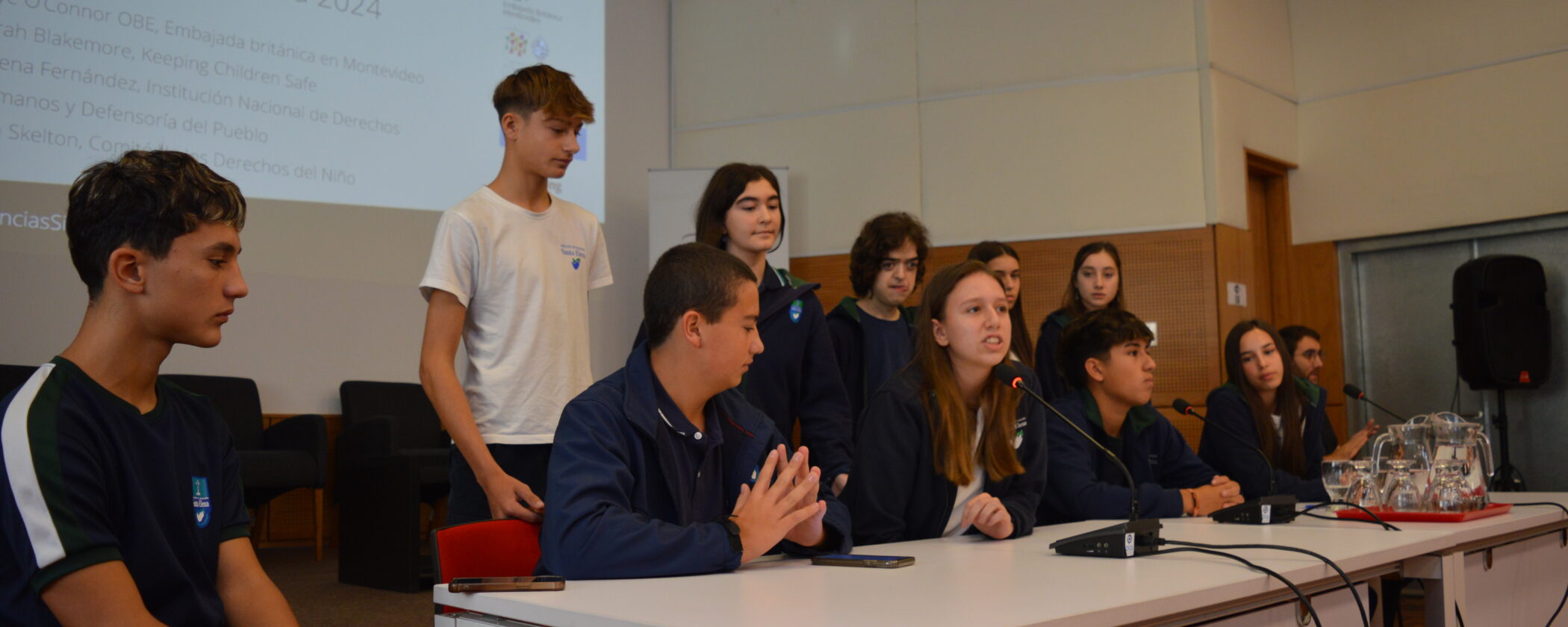On 17 and 18 April 2024, the Child Safeguarding in the Americas Summit 2024 was held in Montevideo, Uruguay and organised by Keeping Children Safe together with the National Institution of Human Rights (INDDHH) and the British Embassy in Montevideo, with the support of SOS Children’s Villages Spain and the University of Reading.
The summit was a platform for the exchange of good practices, knowledge, experiences and common challenges to improve the protection of children and adolescents from abuse, exploitation and neglect in organisations. Around 110 regional and national leaders and representatives attended in person; among them, the Inter-American Children’s Institute and the Pan American Health Organization; Uruguayan authorities such as the Vice Chancellor, the Undersecretary of National Defence, the Judiciary, the Attorney General’s Office, the Human Rights Secretariat, the Central Board of Directors, the National Institute for Adolescent Social Inclusion (INISA) and the Uruguayan Institute for Children and Adolescents (INAU); and local and international organisations such as the Uruguayan Bar Association, British Council, SOS Children’s Villages, Gurises Unidos, Fe y Alegría, El Paso, Cognita Schools, Jesuit Refugee Service, among others. In addition, more than 800 people from all around the world were part of the online event.
Childhoods without violence in the Americas
During these two days, topics such as child safeguarding in legal processes, sports and peace missions, responses within the health system, experiences of regional social organisations and strategies to prevent violence in institutions, among others, were addressed.
The British Ambassador to Uruguay, Faye O’Connor OBE, said during the opening of the summit: ‘One of the most important priorities of the UK government is to care for, support and look after children. Uruguay is the first country in the world to provide troops to the United Nations for peace operations with this child safeguarding institutional system in these complex contexts,’ she said.
She was followed by Sarah Blakemore, CEO of Keeping Children Safe, who explained that ‘every year, millions of children are victims of sexual, physical and emotional abuse, exploitation and neglect, and all organisations have a responsibility to protect them.’
Jimena Fernández, president of the INDDHH, emphasised: ‘We understand that training ourselves, exchanging experiences, thoughts and strategies for intervention are the only ways to contribute to minimising the existence of institutional violence in its different aspects’.
Presentation of the Child-Friendly KCS International Child Safeguarding Standards
At the summit, young people from Uruguay and Spain presented the first version of the child-friendly KCS International Child Safeguarding Standards, together with Felipe Paullier, UN Assistant Secretary-General for Youth Affairs, and Pablo Espiniella, UN Chief of Staff. To watch the presentation, click here.
Young people from the Santa Elena de Lagomar school in Uruguay said of this first version of the standards: ‘The application of these standards guarantees that no matter where we come from or who we are, we will be respected, taken into account and protected. When adults make decisions, they must take us into account first and foremost, they must always listen to us and take what we say seriously’.
The young people from Spain, who are part of SOS Children’s Villages Spain, produced a comic book for this child-friendly version of the standards: ‘In this comic book, we wanted to reflect the importance that in every centre, school, sports club, etc., child safeguarding and children’s rights are worked on and made visible, and thus ensure that we are treated well. But we cannot do this ourselves, we need your help. To achieve this, we need professionals dedicated to this task with sufficient time and financial resources (…) who are trained to create safe spaces,’ they said.
For his part, Felipe Paullier stated: ‘As representatives of institutions and decision-makers, it is our duty to ensure the necessary changes to end violence against children, adolescents and youth. I want to express my sincere admiration to all children, adolescents and young people who work tirelessly for a world free of violence, this is our obligation and that is your right.’
On the standards, Pablo Espiniella said: ‘The importance of enabling and promoting children’s participation involves establishing what safety means to children, what they believe adults should do to keep them safe and secure, and educating and informing children about their rights, including providing safe, inclusive and empowering ways for children to contribute their views, as well as raise complaints and report concerns. Children’s participation and involvement must be a continuous feature of child safeguarding in all organisations.’
Towards schools without violence in South America policy report
In addition, the report Towards schools without violence in South America was launched at the summit. The presentation was led by Valentina Mirabolano, Advocacy and Research Manager at KCS, along with Lorena Peñaherrera, National Director of Education of Ecuador; Gloria Canclini, Director of Human Rights of the National Administration of Public Education of Uruguay; and Pablo Pagés, Head of Citizenship and Digital Wellbeing of Ceibal.
In his intervention, the Vice-Chair of the UN Committee on the Rights of the Child, Luis Pedernera, said: ‘Every time a child experiences violence in institutions, it is 99% likely that this situation will not be resolved through access to justice for children and that impunity and bureaucracy will prevail. Officials are not prepared to deal with issues with the complexity that violence against children and adolescents entails, and this requires a response based on training, capacity building and education’.
Referring to the findings of the report, for which he contributed the foreword, Pedernera said: ‘I have hope that things will change. For Walter Benjamin, philosopher of the Frankfurt School, utopia consists in illuminating those parts of reality that deserve to be definitively destroyed. In the field of violence, we need to illuminate the patches of reality so the way adults and institutions deal with children will finally eradicate violence.
The summit presentations can be viewed on demand at any time in Spanish by registering for free at the following link: https://bit.ly/InfanciasSinViolencia-2024.
Download the full press release in Spanish:
